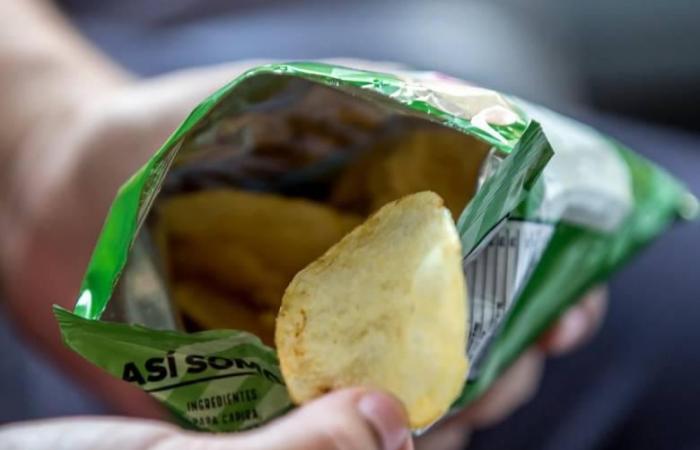Last June 14 was the last day for companies in the ultra-processed industry to maintain round seals. And since that day, Products without octagonal seal will be removed from the market.
Know: Reducing the consumption of ultra-processed foods could help the environment, according to a study
We are talking about these stamps because, from this month of June 2024, Colombia began the adoption of its new labeling system for ultra-processed foods. Edible and drinkable products must now carry an octagonal warning seal, which indicates excess components such as sodium, sugars and saturated and trans fats. This change seeks to better inform consumers about the health risks associated with these foods.
The seal, with a black background and white letters in Arial Bold font, is part of a broader regulation that seeks to combat public health problems such as obesity and cardiovascular diseases. Products that do not comply with the new nutritional and front labeling They will be withdrawn from the market starting June 15, 2024, as established by the Ministry of Health.
So far everything is in order. On June 3, a tweet from content creator @MarioRobertoP went viral in which It highlighted how the Todo Rico company with its Súper Ricas product was able to remove the seals.
“Today they told me something that blew my mind. Those from Super Ricas, a company that produces Todo Rico and other fried foods, do not have seals on their products. And it is because they invested a lot of money so that their products did not have excess trans fats. “I didn’t expect it,” reads his publication.
Also read: ‘Junk’ food also affects your mental health
We must remember that in 2021, The Ministry of Health launched Resolution 810 to regulate how ultra-processed foods should be labeled. Then in December 2022, issued Resolution 2492, which changed those rules and required octagonal labels with clearer messages.
So, instead of circular labels that said things like “high in sodium,” We now have octagonal labels that warn of “excess sodium.”. Studies have shown that these new labels are more effective because they better alert consumers.
The regulations established that, as of June 15, 2024, All ultra-processed products that exceed certain levels of sodium, saturated fats, sugars and trans fats must carry these octagonal labels. If they do not comply, they will be removed from the market.
You may be interested in: Oil palm production will fall in 2024 due to El Niño phenomenon; the president of Fedepalma speaks
The day after June 14, Juan Camilo Mesa, known as El Nutri Dice on social networks, nutritionist, dietitian and microbiologist, and master in Nutrition, issued some warnings about an alleged reformulation of this company that “allowed him to avoid” the seals of warnings.
Mesa clarified that Companies entered a race to reformulate before it was mandatory for everyone to include the seals (at the end of May). He specified that there are different ways to reformulate, such as substituting ingredients. “And there are others that are not so kind.”
The expert explained that The new law requires putting an “excess in” seal on all products that have more than X amount of the critical nutrient in public health because in excess it produces disease. This is what it looks like in Resolution 2492 of 2022:
Mesa made a comparison between the previous Todo Rico product, which is on the official website, with a new one without seals. “Let’s compare, then, the old formulation (35 grams per serving), versus the new one (40 grams per serving). We see that the portion is now 5 grams larger, which brings 31 more calories, the saturated fat content was reduced by 2.2 grams and the sodium content also decreased by 159 milligrams.”
He added: “The ideal would be, purists would say, to compare the content in 100 grams, but this is the portion that the bag comes with and that the person eats. Do you remember that if it provides more than 10% of the energy in saturated fat, it has a seal? Well, the new formulation was at 9.81% (on the verge)”.
And how did they do that? How did they avoid the seals? Mesa gave two answers: Most saturated fats would have been replaced by unsaturated fats, and protein also provides calories.
“Where does it come from in the reformulated product? From the pork skin and some of the yeast extract… Other ingredients in the new formulation include palm oil and corn oil. Oils of poor nutritional quality.”
Regarding this case, Mesa drew two conclusions. The first, the law is made, the trap is made. “The industry was never interested in our health.” The second, the labeling law, must be rethought based on experience once the implementation deadline for all products expires.
The nutritionist’s explanations did not stop there, this Sunday, June 16, Mesa published a thread on his X account, before Twitter, to explain how companies are using some ingredients to avoid ultra-processed warning seals.
He mentioned several names like Monosodium glutamate, which enhances the flavor and prevents excess sodium. As well as Maltodextrins, They would also behave like free sugars and avoid excess sugars. And poor quality fats low in saturated fat, this avoids excess saturated fat.
Also: “Direct sales, an option for lean times”
“They are playing with calories and the absence of the “excess calorie” seal. They produce items that are very high in calories and low in quality nutrients,” warned the nutrition expert.
Therefore, he insisted that The implementation of the “excess calorie” seal is urgent, because if the protein increases, the calories also increase. “And protein is not punished with warning labels. I also see it necessary to change the definition of penalized sugars,” Mesa recommended.
This week a report from the digital portal Vorágine was also released on this same topic and in which it reports on how the food industry does not stand still and has several strategies so that its products attract less attention from the new warning labels.
This report cited Mylena Gualdrón, director of Fian Colombia, who said that You’ve seen products displayed upside down on shelves to hide the octagons that warn about ingredients like excess sodium. Furthermore, the resolution has not yet managed to regulate nutritional claims.
For example, a Kellogg’s cereal with a warning label says on the side: “fruit-flavored corn, wheat and oat cereal blend with vitamins and minerals.” In another case, Super Ricas’ Todo Rico product appeared on shelves without warning seals.
Read also: These are the nine storms that hit Colombian foreign trade in the midst of a turbulent panorama
How they did it? The report, based on statements from experts such as Mesa cited above, detailed that They played with the calories: they increased some things so that it wouldn’t affect them, for example, they increased the protein (in this case, pork skin), which increases the calories without being punished by the law.
According to Mesa, There are three ways to increase calories: with protein, fat or carbohydrates. Protein is not punished, carbohydrates are, depending on whether they are added sugars, and fats only if they are saturated. Thus, companies use proteins of any type, such as yeast extract, which does not make sense in some products, but serves to increase the protein.
Mesa told Vorágine that the new Todo Rico formulation has 31 more calories. Saturated fats were replaced with unsaturated fats, and the protein came from pork skin and yeast extract. The flavor is maintained thanks to the monosodium glutamatea flavor enhancer that they did not use before.
That is, the industry plays with the type of fats: saturated and unsaturated. It is not about eliminating saturated fats, but about reducing excessive consumption due to its implications for health.
In summary, Super Ricas lowered the saturated fats in its star product, probably by changing the type of oil with which they fry the pork rinds, potatoes and tajaditas. But that doesn’t mean Todo Rico is healthier just because it no longer carries warning labels.
Keep reading: Finagro seeks to eradicate the ‘drop by drop’ in Colombia with a subsidy on the interest rate for two years





